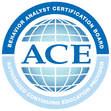Courses for Behavioral Practitioners
ParaprofessionalsAreas of Exceptionality (PAD01)
This presentation is designed to introduce paraprofessionals to the various types of disabilities that they may encounter. Topics include: Intellectual disabilities, learning disabilities, emotional disabilities, speech/language impairment, physical/health impairment, visual/hearing impairment, traumatic brain injury, autism, and attention deficit disorder. 2 hrs. Individualized Educational Plans (PAD02)
This presentation is designed to introduce paraprofessionals to the various supports and services available through the IEP, including related services, instructional adaptations and modifications, and testing accommodations. 2 hrs. The Role of the para as a facilitator (pad03)
This presentation is based on the book “How To Be a Para Pro” (2000). Topics include: Building a relationship, incidental teaching, strategies for supporting adolescents, maintaining confidentiality, and supporting students in the community or workplace. 2 hrs. PBS is an approved continuing education provider for the New York State Education Department and the Behavior Analysis Certification Board. We are also an approved Independent Fieldwork provider for several programs offering BCBA certification. |
Professional Development25 Essential Skills and Strategies for the Professional Behavior Analyst (PRD01)
This presentation, based on the book by Bailey & Burch (2009), describes the skills and strategies required of behavior analysts. Topics include leadership, public relations, competence, and problem solving/troubleshooting. 2 hrs. A Behavioral Classification of Language (PRD02
This presentation provides an overview of Skinner’s description of verbal operants, including the mand, tact, echoic, and intraverbal. Specific examples of each of these operants will be reviewed. Research articles focusing on mand training will also be reviewed. 2 hrs. Best Practices for Providing Home Services (PRD03)
This presentation describes how to start a home-based intervention program, and how to collaborate with parents on creating and maintaining a home program. 2 hrs. CARS-2: Childhood Autism Rating Scale (Second Edition) (PRD04)
This workshop provides an overview of the administration and scoring of the Childhood Autism Rating Scale-Second Edition, and discusses the use of this standardized instrument as a guide for assessment and intervention planning. 2 hrs. Ethical Situations: A Review of the BACB Professional and Ethical Compliance Code for Behavior Analysts (Part 1) (PRD05)
This presentation focuses on the Behavior Analyst Certification Board’s (BACB) ethical principles of competence and treatment efficacy. Each principle will be presented based on the BACB Professional and Ethical Compliance Code for Behavior Analysts. Case examples of each principle will be presented and the article The Right to Effective Behavioral Treatment (1988) will be reviewed and discussed. 1.5 hrs. Ethical Situations: A Review of the BACB Professional and Ethical Compliance Code for Behavior Analysts (Part 2) (PRD06)
This presentation focuses on the Behavior Analyst Certification Board’s (BACB) ethical principle of confidentiality. The Health Insurance Portability and Accountability Act (HIPAA) and the Family Education Rights and Privacy Act (FERPA) will be reviewed and discussed. Case examples illustrating various ethical dilemmas related to confidentiality will also be considered. 1.5 hrs. Gaining Cross-Cultural Competence in Working with Individuals with Developmental Disabilities and Their Families (PRD07)
This presentation focuses on providing participants with an overview of being cross-culturally competent when working with families from culturally diverse backgrounds. Cross-cultural competence and enculturation will be defined, and ways to assess for a family’s enculturation will be described as part of completing an assessment of an individual’s behavior. Research articles addressing Parent Training and Social Skills Training will be reviewed to illustrate how cultural sensitivity can improve outcomes for individuals from culturally diverse backgrounds. 1.5 hrs. Parent Training Essentials (PRD08)
This presentation provides an overview of a six-step guide for conducting Parent Training, including how to prioritize target goals and how to monitor progress. The target audience for this training is clinicians (e.g., Social Workers, School Psychologists). 1.5 hrs. Professional Conduct (PRD09)
This presentation reviews the role of the consultant when working with families and schools. Ethical issues related to professional conduct, including confidentiality issues, will also be covered. 1.5 hrs. |





